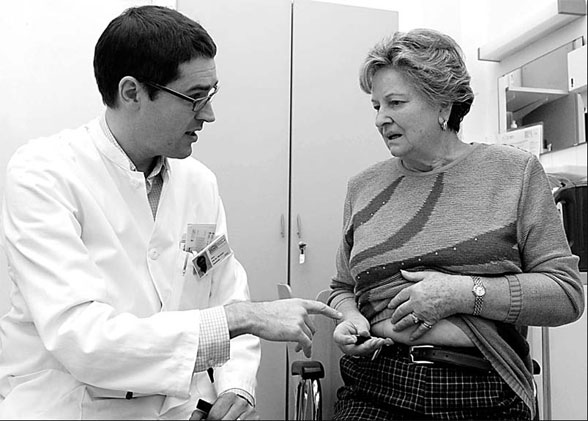Roche eyes up diabetes market
|
A doctor advises a patient how to use an insulin pen in his surgery in Munich, Germany. Bloomberg News |
Cancer drugs have propelled Roche Holding AG's profit by more than 20 percent a year since 2004. To continue the pace, the Swiss company is racing to break into the fast expanding, $21 billion-a-year diabetes market.
Switzerland's biggest drugmaker has helped transform the way doctors treat cancer with medicines that choke the blood supply to tumors or block proteins that fuel the disease. Now Roche is challenging Novo Nordisk A/S and Eli Lilly & Co, the world's biggest marketers of insulin, with drugs that may make daily diabetes injections a thing of the past.
Revenue from diabetes treatments will rise by about 50 percent in the next two decades. Roche is testing about seven treatments to help it exploit the diabetes market before patents expire on cancer medicines accounting for half its 36.8 billion Swiss francs ($34.9 billion) in 2007 drug sales. While the leading drug candidate is a year behind a similar one from Lilly, Roche's financial strength may help it overtake rivals.
"Roche caught on much earlier than other companies that me-too compounds aren't going to excite anyone," said Denise Anderson, an analyst at Landsbanki Kepler, based in Zurich. "When you look at other blue-chip drugmakers, only about half of their top products are truly differentiated, whereas with Roche it's eight out of ten."
Roche is growing faster than Novartis AG, also based in Basel, because of its best-selling cancer drugs. Revenue from Avastin, the first treatment to work by cutting off blood supply to tumors, climbed 41 percent to 4.1 billion Swiss francs last year, while sales of breast cancer drug Herceptin rose 23 percent to 4.9 billion francs.
Cancer medicines
Roche shares fell 2.4 percent to 169 Swiss francs on Tuesday in Zurich trading. The stock has declined 13.5 percent this year, about the same as the 14 percent drop in the Bloomberg Europe Pharmaceutical Index of 13 companies.
The Swiss drugmaker's most advanced diabetes treatment is a once-weekly injection that exploits the body's own mechanisms to boost insulin production. Roche's compound can also curb appetite and reduce obesity, research indicates.
The medicine is a so-called glucagon-like peptide-1 analogue, which mimics a hormone, incretin, that stimulates the pancreas to produce insulin when blood sugar levels rise too much. Diabetics can't produce enough of the insulin needed to absorb sugar, which collects in the blood rather than being absorbed by muscle and fat cells. This accumulation of glucose can lead to kidney failure, blindness and heart disease.
"Roche is the one company that's investing in innovative products," said Dieter Winet, who helps oversee $56 billion at Swisscanto Asset Management, based in Bern, Switzerland. "It's much more sensitive to new treatment areas than Novartis."
While the active ingredient in the first GLP-1 analogue to be sold, Lilly's Byetta, is derived from Gila monster lizard spit, Roche says its product is a synthesized version of human GLP-1. The molecule is also smaller, allowing for a needle that can be hidden in a disposable pen-like device. Byetta's weekly version will need to be added to liquid and comes with a bigger needle and syringe.
"We're aiming for a drug that is very competitive on blood glucose, side effects and weight loss and we're also aiming for a very elegant device," Luke Miels, who oversees Roche's strategic marketing for metabolism and anemia, said in an interview. Preliminary data "is very encouraging", he said
Byetta was introduced in 2005 and is taken as a twice-daily injection. France's Sanofi-Aventis SA, London-based GlaxoSmithKline Plc and Denmark's Novo Nordisk are working on similar compounds.
Competition
"Roche will most likely be the third on the market," Anderson said. "But if you have a product that's much better in terms of the ease of use, that makes the issue of being later to market basically irrelevant."
Research has shown that a daily version of Roche's product and the daily version of Byetta both can control blood sugar and bring weight loss, and have similar side effects, said Nick Giannoukakis, a researcher at the University of Pittsburgh School of Medicine who's studied phase II tests.
Roche plans to present patient studies on the weekly dose at the American Diabetes Association meeting in San Francisco in June, when it will announce whether it plans more tests.
"Almost all of the weekly GLP-1 analogues will work - the differences will be in the subtleties such as just how much weight loss or nausea there is," said Daniel Drucker, senior scientist in the Samuel Lunenfeld Research Institute at Mount Sinai Hospital in Toronto. Advanced trials will show which works best, he said.
Lilly said in October a weekly dose of Byetta it is testing controlled blood sugar better than the daily form and it would seek marketing approval in 2009, before Roche's filing a year later.
"We believe the GLP-1s will blow everything else out of the water," Anderson said. "The control on blood sugar is similar to everything else out there, but there's a lot of excitement about the weight loss and there are potential benefits on the side effect profile."
Agencies
(China Daily 05/08/2008 page16)















